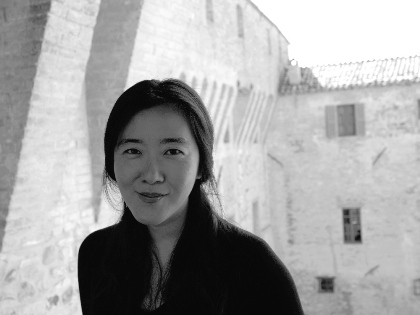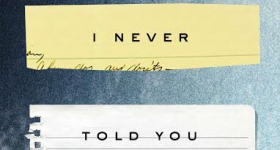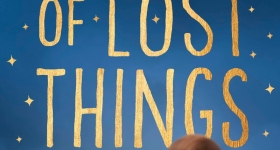Georgic: Stories is a little gem of a collection by Mariko Nagai. But I must warn you, it is not for the faint of heart. There were many times when I felt chilled to the bone reading Nagai, but also delighted, wondering, ‘How did she do that?’ If I tell you the subject of her stories -- war, drought, pestilence, poverty, prostitution, lepers -- it might discourage you from reading it. But that would be a shame for the stories are richly textured, emotionally true and beautifully rendered.
The book won the G.S. Sharat Chandra Prize for Short Fiction, selected by Jonis Agee, and the title refers to the literary form “georgic,” poems about farming and rural life. It enjoyed great popularity during the 18th century in England when all the land had been tamed into comfortable plots. But Nagai says she wanted to take it back "in a Virgilian sense, where tension between the men and the land was as real as probable famine, where men's faces were ravished by the elements, their backs molded by the earth, and their lives bound to the fate of the land."
This is starkly illustrated in the title story where villagers about to run out of food must take their old people up into the hills and abandon them in order to survive. It begins:
Harvest. Another failure. Third year in a row. Now. The posted sign in the village center: All people unable to work must leave within two weeks. Children exempted.
Life has come close to the bone in this unnamed village. Starvation is looking likely for all.
The villagers come to me one by one, late at night. They ask what they should do, what we should do. We have no more daughters to sell; we have nothing to eat. And this is only the beginning, we survived eating roots in spring … must we all? Must we all die?
No one is exempted. Even the narrator's mother, once the well-respected midwife of the village, must leave. She will be carried on her daughter's back, up a steep mountain to be left with the others near a waterfall.
So they will not starve, so they will not go thirsty, so they will not die alone; they will live, so the villagers say, they will live longer than we will, so the villagers say, they will live longer than we will, the villagers say. And they say many things more. Many many more.
In another story, a woman is forced to sell her infant daughter in order to pay for her journey back home when she is caught on the wrong side of the border as war breaks out.
I have killed her in my mind so that I could live on, so that she could live on. Even if it means she'd live the rest of her life hating me for abandoning her, it is better to be able to hate than to be dead, without hate.
The woman goes back home, remarries and starts another family, and tells no one about her shameful secret. But it costs her terribly.
You do not know that your husband lies next to you at night, thinking of lying with someone else, someone less severe, someone more accessible, someone that he loves. And your children, these children that will grow up tilling the earth, these children will later look back and wonder if they have ever been held. They will say amongst themselves, she was a good mother, but they will never utter, she loved us. They will say, there was always a distance between us, as if she were somewhere else, as if she left a part of herself somewhere.
Nagai shows simply and elegantly the awful choices we sometimes make when we choose life.

In one of the most memorable stories, "how we touch the ground, how we touch," Catholic members of an underground church in 17th-century Japan are forced to witness the horrific ordeal of their Elder, a man who has refused to recant.
The Elder calmly steps away from the line. His wife and daughter step away from the line with him. He announces that he cannot lie, no matter what, not anymore, not ever. The Elder says that he is too tired to live the life of a lie, an apostate, and he is an apostle, he has been the apostle who has had to live as an apostate.
They bind his wife and daughter, jab a dull knife under their nails, slowly cut off parts of their ears and noses, brand them with burns in the shape of a cross while the Elder watches, half hysterical, singing "like a domesticated finch." It gets worse, horribly worse. Finally, the members are called upon to kill the Elder with their own hands, and they rush upon him with relief.
And we kick, I kick as hard as I can, quickly, swiftly, we claw and kick, so that the Elder will die quickly, so that he will be delivered to De-us quickly, so he can tell Him that there are many of his believers still waiting, still praying for Him to release us, to give us permission to return to His arms, that we are still waiting. We cannot wait for the world to end, we cannot wait for the faithless to die. And we kick, tear, praying silently, please take the message for us, for prayers have been lost somewhere between the ground and the sky, please take the message, we punch, pull until the Elder is nothing but a heap of tattered flesh, tattered meat, and he whispers, thank you, thank you, and we kick for easy deliverance, for mercy, for forgiveness, and for many things, and he is no more.
Nagai perfectly catches the hysteria and despair of the narrator in that last paragraph, ending breathlessly at the exact moment of the death of the Elder.
The stories would sometimes be hard to read if it weren't for Nagai's beautiful sense of language. At times her sentences sing, aided by her liberal use of commas, which keeps the momentum going and going and going like a piece of music building to a glorious end. The ten stories in this collection moved and disturbed me, satisfied and haunted me for many hours and days after. I know it is a book I will keep going back to.
In her foreward, Jonis Agee writes, "Nagai has a voice and vision to be reckoned with. There is wisdom here, ancient and modern. It has never left us, it simply awaits the discoverer who cannot turn away, who must not let history be rewritten, who must bear witness as each generation has, to the cruelties and kindnesses, the observances that shape our lives." Nagai has a powerful voice, an important one. Her remarkable stories show us, ‘Yes, we were like this. We are still like this.’
Caroline Kim-Brown is Hyphen's fiction editor.









Comments